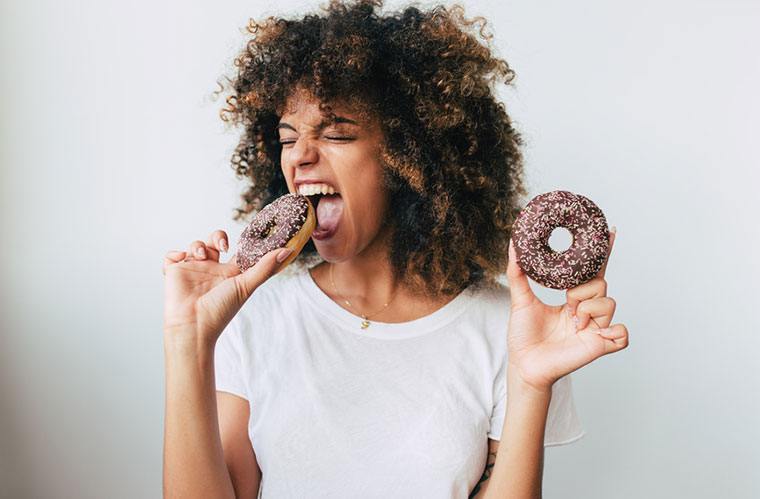Stay Away From These 5 Foods Before Bed for Better Sleep (and Long-Term Health)
The whole eating-before-bed thing is a delicate dance. Overindulging can lead to a restless night; but if you go to bed with your stomach growling, you may not be able to drift off in the first place. To make matters even more confusing, research on the topic seems to raise more questions than answers. Does a bedtime snack help stabilize blood sugar? Or should you abstain entirely for the last three hours of the night to avoid gaining weight? Do carbohydrates help send you off to sleep or keep you awake? Is the nightcap obsolete or can you have one glass of wine before bed without consequence?
"Some studies show that eating closer to bedtime does result in weight gain, but mostly because this allows for a higher number of eating occasions throughout the day, leading to overall increased caloric intake," says Nutritious Life founder Keri Glassman, RD. "Meanwhile, other studies show that small meals before bed—around 150 calories—might be beneficial for 'muscle protein synthesis and cardiometabolic health.'" Translation: muscle growth and healthy heart.
"If you tend to eat closer to bedtime, it’s less likely that you’re snacking on sliced veggies or an apple," says Keri Glassman, RD.
According to Glassman, you should ideally be eating whole foods consistently throughout the day. And if that means a healthy snack before you turn in for the night, it shouldn't be a problem for your health—just as long as you're bingeing on Netflix and not late-night cookies. The better you eat before you hit the pillow, she says, the more able your body is to focus on recovery rather than digestion while you sleep. "And if you tend to eat closer to bedtime, it’s less likely that you’re snacking on sliced veggies or an apple," says Glassman. (Gulp—so true!)

{{post.sponsorText}}
Tempted to sacrifice one night of sleep for a midnight pizza run? Nutritionist Charles Passler, DO, strongly suggests you reconsider. "Disrupted sleep is a primary culprit for poor health," he says. "It will create physical, mental and emotional challenges including lowered cognition, depression, and joint and muscle problems."
So, what exactly can you eat before bed if you find yourself with irresistible hunger pangs at night? "The best food choices are high in protein and low in fat, sugar, and carbs," says Dr. Passler, who specifically recommends cottage cheese, Greek yogurt, milk, protein powder containing whey, egg whites, and lean protein as options. Glassman adds that 10 to 15 almonds and cashews, which contain protein and sleep-enabling magnesium, are also a healthy choice.
Since we can't (or won't) always be conscientious enough to scramble eggs before bed, however, it can be more helpful to red-light specific foods and beverages late at night, suggests Dr. Passler.
So, if you must snack, here's what to skip.

1. Alcohol
"Drinking before bed can make you drowsy, but the reality is that drinking alcohol makes you more likely to wake during the night, leaving you feeling less rested in the morning," explains Dr. Passler. "Alcohol at bedtime has also been shown to increase snoring, which can create sleep disruption."
2. Coffee and tea and drinks containing caffeine
"Science shows that the effects of caffeine are not completely broken down and removed from the body for up to 20 hours," Dr. Passler says. One study found that caffeine consumed even six hours before bed could disrupt your night's sleep.
3. Dark chocolate
While it's touted as a healthy bedtime dessert—dark chocolate is loaded with healthy antioxidants—Dr. Passler says it may also pack a punch of caffeine. "It also contains theobromine, which has similar effects to caffeine and the combination of the two is detrimental to a good nights sleep," Dr. Passler says.
4. Spicy foods
"Spicy foods before bedtime can create indigestion," Dr. Passler says. Capsaicin, the active ingredient found in the majority of spicy foods, can also raise your body temperature, making it harder for you to drift off.
5. Unhealthy fatty foods and processed foods
"Putting a burden on the digestive system and the liver due to the consumption of unhealthy fatty foods, like deep-fried foods and processed foods, is never a good idea," Dr. Pass;er cautions. "And it is a terrible idea at bedtime because sleep disruption is created by the digestive system, liver, and kidneys being overworked."
Want to stop making bad food choices at night? Perhaps you should consider becoming a morning person. You may also want to switch up your daytime diet—here are 3 healthy eating habits French Girls swear and you should, too.
Loading More Posts...